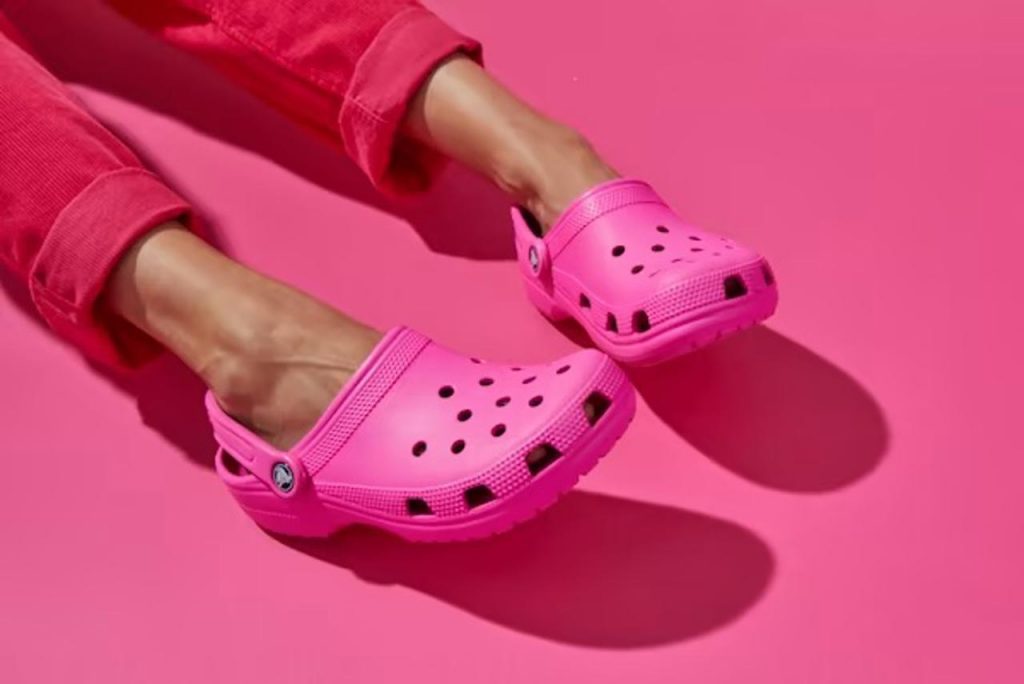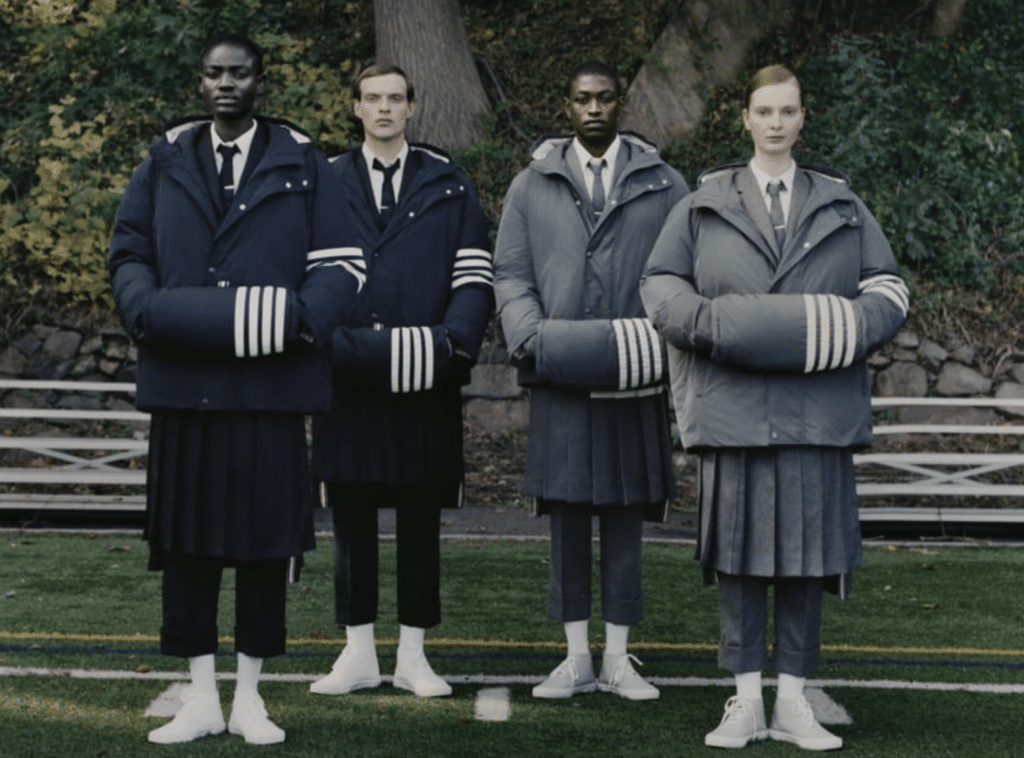The International Trade Commission (“ITC”) has terminated an investigation centering on footwear that allegedly infringes Crocs well-known foam clogs. On the heels of Crocs filing a complaint with the ITC in 2021, alleging that more than 20 companies – including Skechers, Walmart, Hobby Lobby, and Loeffler Randall – were violating section 337 of the Tariff Act by unlawfully importing and/or selling footwear that infringes its federal registered trademarks, the U.S. trade regulator found no violations by any of the companies that had not yet settled with Crocs. Siding with Crocs to an extent, the ITC issued limited exclusion orders, blocking the defaulting companies from importing, selling, marketing, and distributing the allegedly infringing footwear.
In a notice dated September 14, as first reported by TFL, the ITC stated that it had determined that despite Crocs’ claims, Hobby Lobby Stores, Inc. (“Hobby Lobby”), Quanzhou ZhengDe Network Corp. d/b/a Amoji (“Amoji”), and Orly Shoe Corp. (“Orly”) had not violated section 337 of the Tariff Act. (Section 337 prohibits unfair methods of competition and unfair acts in the importation of articles into the U.S.)
In the complaint that it filed with the ITC in June 2021, Crocs argued that while there is a “virtually infinite number of different, non-infringing footwear styles in existence today,” and there is a lack “any actual competitive need to use the Crocs marks in commerce,” a number of competitors had taken to “intentionally and frequently” replicating its “unique and recognizable” footwear. The “copycat” products are “not due to competitive need,” Colorado-based Crocs claimed, “but because of the significant goodwill that the Crocs marks have accumulated over the past two decades during their use by Crocs.”
Against that background, Crocs alleged that the companies had been importing footwear that infringed and/pr diluted “one or more” of its trademark registrations (Reg. Nos. 3,836,415; 5,149,328; and 5,273,875), which cover the CROCS word mark, as well as the “three-dimensional configuration” of its foam clog upper design (the “3D Marks”). Crocs also argued that the almost-two-dozen footwear companies were engaging in false designation of origin.
For a bit of background: The ITC instituted an investigation in July 2021 in response to Crocs’ complaint, and subsequently terminated the investigation with respect to the bulk of the respondents – including Skechers, Cape Robbin, Wild Diva, Loeffler Randall, and Walmart, among others – on the basis of settlement agreements or consent orders.
Following an evidentiary hearing, the ITC’s administrative law judge (“ALJ”) issued an initial determination (“ID”) in January, finding no violation of section 337 because Crocs did not prove that the respondents infringed or diluted the trademarks at issue, or that the respondents falsely designated the origin of their accused products or caused unfair competition. Beyond that, the ALJ found that Crocs’ registrations for the 3D Marks (namely, Reg. Nos. 5,149,328 and 5,273,875) are “invalid for lack of secondary meaning.”
The 3D Marks & Secondary Meaning: Addressing the 3D Marks, in particular, the ALJ stated in the ID that Crocs “has not continuously and consistently promoted the 3D Marks in its advertisements.” The ALJ found that the evidence produced by Crocs “also shows that, contrary to Crocs’ assertions, the 3D Marks do not always appear, and certainly do not always prominently appear, in Crocs’ advertisements. The exemplary advertisements also show that the 3D Marks are not visible at virtually any angle. All of this makes it unlikely that Crocs’ advertisements created a mental association in the minds of consumers such that they identify the 3D Marks with Crocs.”
In a partial victory for Crocs, the ALJ found that the respondents had failed to prove that the trademark registrations for the 3D Marks are invalid as functional or that the CROCS word mark is invalid as generic. And finally, the ALJ did not take a position onCrocs’s alleged injury or the respondents’ fair use defense in its ID.
In April, the Commission revealed that it would review various aspects of the ID, including the findings that: (1) Crocs waived its infringement contentions against the lined version of Orly’s Gators; (2) the 3D Marks are not entitled to the presumption of validity and are invalid for lack of secondary meaning; (3) Crocs waived its infringement contentions against the defaulting respondents; (4) subject matter jurisdiction; (5) likelihood of confusion; (6) false designation of origin; (7) dilution; and (8) the technical and economic prongs of domestic industry.
The Commission’s Decision – Fast forward to last week and having reviewed the ID, the parties’ submissions, and the evidence of record, the Commission “affirm[ed] and adopt[ed] the ID’s findings that the respondents have not infringed or diluted any of the asserted marks, falsely designated the origin of their [allegedly infringing] products or engaged in unfair competition.” At the same time, the Commission reversed the ID’s finding that Crocs waived its infringement contentions with respect to certain versions of Orly’s clogs (its lined Gator shoes), and found, instead, that Crocs failed to prove that Orly’s Gator footwear amounted to infringement.
The Commission has further issued a limited exclusion order against the defaulting respondents, La Modish Boutique, Star Bay Group Inc., Huizhou Xinshunzu Shoes Co., Ltd., and Jinjiang Anao Footwear Co., Ltd.
The ITC proceeding is only part of the picture, however, as in July 2021, Crocs filed separate – but related – trademark lawsuits against many of these same companies, including Walmart, Loeffler Randall, and Hobby Lobby Stores. Since no monetary damages are available at the ITC, in order for companies to have a chance at obtaining both injunctive relief (in the form of exclusion and cease-and-desist orders) and monetary damages, they need to initiate proceedings before the ITC and a district court, making it common for companies to pursue litigation in tandem with the ITC proceedings.
One of the longest-lasting of those suits, which saw Crocs wage trademark claims against Walmart in the U.S. District Court for the District of Colorado, settled in September 2022.
The case is In the Matter of Certain: Casual Footwear and Packaging Thereof, No. 337-TA-1270.













